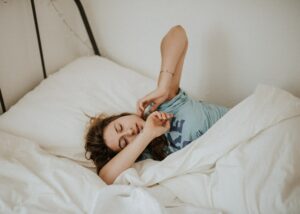
While the holidays can be full of excitement and merry-making, they can also be a huge stress on our sleep schedule!
Our circadian rhythm timekeeping system is pretty amazing. This intrinsic system modulates many physiologic processes, including daily rhythms in core body temperature, melatonin secretion, cortisol and appetite. It drives wakefulness during the usual wake period and helps the body remain asleep at night, particularly the latter half of the night when the other part of our sleep regulation system, the “homeostatic sleep drive,” which accumulates during wakefulness, rapidly diminishes after the first half of our sleep. A properly-aligned circadian system decreases alertness during the second half of the night, helping to maintain sleep until the normal wake-up time.
In the absence of incoming information about time, the intrinsic circadian rhythm is slightly longer than 24 hours. This has been well-studied – on average, it is about 24.2 hours in adults and 24.3 hours in adolescents. This doesn’t seem like much of a difference from a 24-hour day, but to maintain alignment over time, the circadian system must adjust, or “phase shift,” each day via time cues, the most important of which is light/dark input. Other inputs include meal times, activities and social interactions. Light exposure during the last few hours of the typical sleep period and the first few hours after typical wake time moves the circadian rhythm earlier (“phase advance”). Conversely, light in the evening and first half of the usual sleep period moves the circadian rhythm later (“phase delay”). This leads to all of the hacks you’ve probably heard for optimizing sleep cycles in areas where light/dark cycles don’t mimic optimal sleep cycles. It also is part of the rationale behind avoiding use of light-emitting devices and, in particular, blue light exposure for several hours prior to bedtime. Retinal circadian photoreceptors are maximally sensitive to blue light.
Ok, so you may or may not find all of this as fascinating as I do, but how does all of this lead to practical things you can do over the holidays to optimize your own circadian rhythm and sleep?
Here are some practical tips on how to harness the power of your circadian rhythm to better tune it to your holiday plans:
- For those traveling to another time zone, the first step takes place well before you set foot on a plane. To make the time transition easier, you can start making an adjustment to your sleep schedule slowly, by moving bedtime by ½ hour every few days, until you match the time zone of your travel destination.
- Melatonin, a hormone made naturally by your pineal gland to regulate circadian rhythm, can be gently supplemented to help with time transitions. Starting about a week before your trip, taking melatonin (I recommend 0.5mg nightly) one hour before you plan to go to sleep in the time zone you’re traveling to will help your body adjust to that time zone.
- When and how you eat is important. By all means, please enjoy the rich foods of the holidays! But it can help to remember that eating large or overly rich meals can cause heartburn, stomach pain, bloating and gas that can be uncomfortable and negatively impact sleep. Try not to eat to the point of feeling excessively full, and avoid known trigger foods for you. If you know you are going to want a trigger food for indigestion, try taking an acid-blocker, such as Pepcid, one hour prior to the meal. When you eat is also important – an early dinner (4+ hours before bedtime) gives your body time to digest.
- Holiday cocktails may make you feel sleepy, and may even help with sleep initiation, but as many of us know – alcohol is a big disrupter of sleep cycles, often preventing deep and REM sleep. Try to limit the number of drinks you enjoy during the evening hours, or move cocktail hour up a few hours to avoid alcohol well before bedtime.
- Holiday stress – can, of course, impact sleep. Stress raises cortisol, which is extremely wake promoting, and can make it difficult both to fall asleep and to stay asleep. If you sometimes find the holidays more stressful than relaxing, your sleep will thank you for creating space for stress management – exercise, meditation, deep breathing exercises (especially before bed), and avoiding stimulants, like caffeine, during the day but particularly after noon.
- Other helpful and practical tips, briefly (and to find more, check out this article from the Fitbit blog from last year):
- Stick to your routine as much as possible (lights out at the same time each night, wake at the same time each morning)
- Give yourself time to wind down before bed
- Make sleep a priority
Wishing you the happiest of holidays and good quality sleep!
Jennifer Abrams, MD, December 9, 2022


